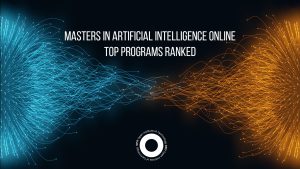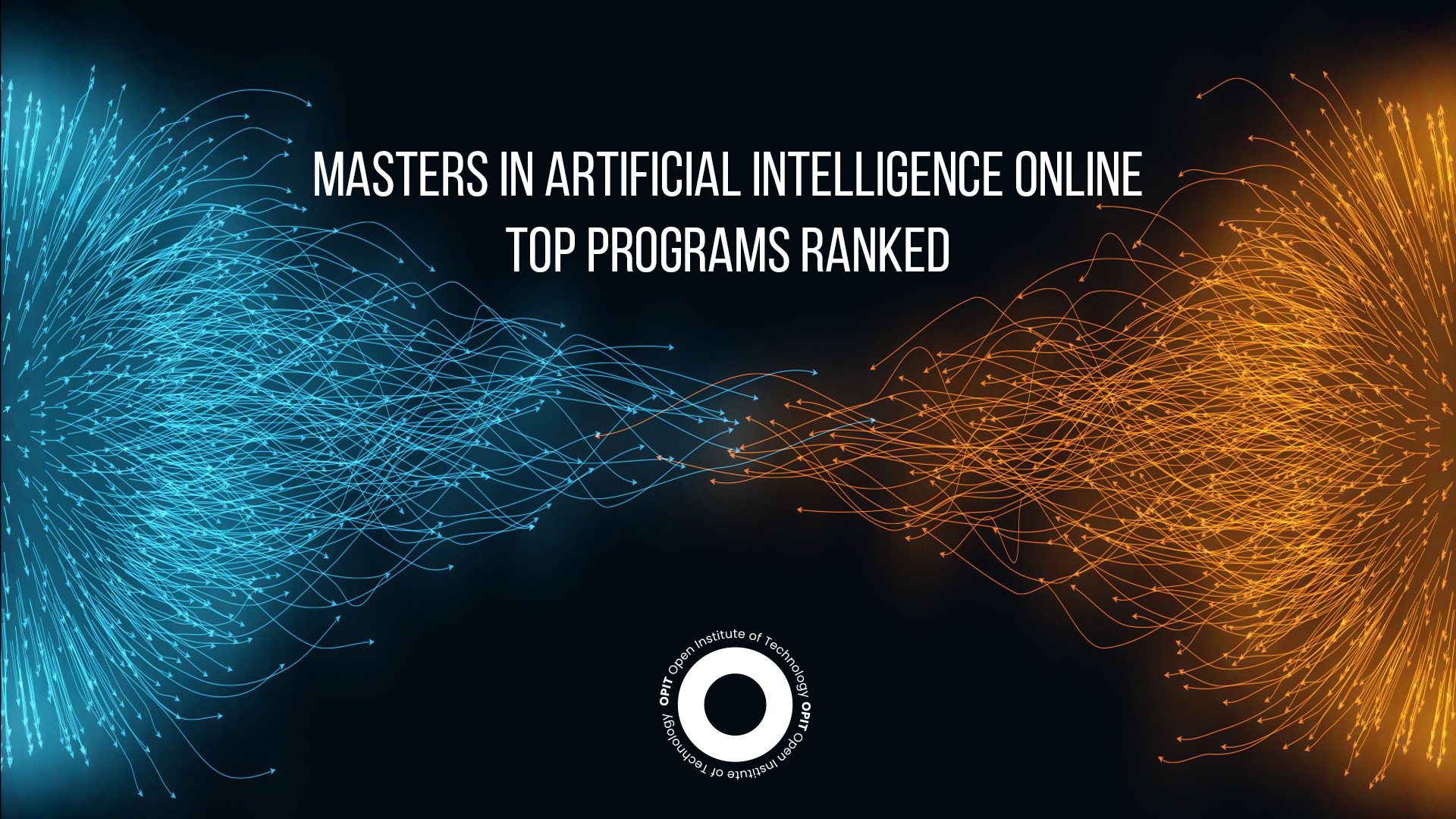

You may have heard the catchy phrase “data is the new oil” floating around. The implication is that data in the 21st century is what oil was in the 20th – the biggest industry around. And it’s true, as the sheer amount of data each person generates when they use the web, try out an app, or even buy from a store is digital “oil” for the companies collecting that data.
It’s also the fuel that powers the current (and growing) wave of artificial intelligence (AI) tools emerging in the market. From ChatGPT to the wave of text-to-speech tech flooding the market, everything hinges on information, and people who can harness that data through algorithms and machine learning practices are in high demand.
That’s where you can come in. By taking a Master’s degree in artificial intelligence online, you position yourself as one of the people who can help the new “digital oil” barons capitalize on their finds.
Factors to Consider When Choosing an Online AI Master’s Program
When choosing an artificial intelligence online Master’s, you have to consider more than the simple accessibility the course offers. These factors help you to weed out the also-ran programs from the ones that help you to advance your career:
- Accreditation – Checks for accreditation come in two flavors. First, you need to check the program provider’s credentials to ensure the degree you get from your studies is worth the paper on which it’s printed. Second, you have to confirm the accreditation you receive is something that employers actually want to see.
- Curriculum – What does your artificial intelligence online Master degree actually teach you? Answer that question and you can determine if the program serves the career goals you’ve set for yourself.
- Faculty Expertise – On the ground level, you want tutors with plenty of teaching experience and their own degrees in AI-related subjects. But dig beyond that to also discover if they have direct experience working with AI in industry.
- Program Format – A self-study artificial intelligence Master’s program’s online nature means they offer some degree of flexibility. But the course format plays a role in your decision, given that some rely solely on self-learning whereas others include examinations and live remote lectures.
- Tuition and Financial Aid – A Master’s degree costs quite a bit depending on area (prices range from €1,000 to €20,000 per year), so you need to be in the appropriate financial position. Many universities offer financial aid, such as scholarships, grants, and payment programs, that may help here.
- Career Support – You’re likely not studying for Master of artificial intelligence online for the joy of having a piece of paper on your wall. You want to build a career. Look for institutions that have strong alumni networks, connections within industry, and dedicated careers offices or services.
Top Online AI Master’s Programs Ranked
In choosing the best Master’s in artificial intelligence online programs, we looked at the above factors in addition to the key features of each program. That examination results in three online courses, each offering something a little different, that give you a solid grounding in AI.
Master in Applied Data Science & AI (OPIT)
Flexibility is the name of the game with OPIT’s program, as it’s fully remote and you get a choice between an 18-month course and a fast-tracked 12-month variant. The latter contains the same content as the former, with the student simply dedicating themselves to more intensive course requirements.
The program comes from an online institution that is accredited under both the Malta Qualification Framework and European Qualification Framework. As for the course itself, it’s the focus on real-life challenges in data science and AI that makes it so attractive. You don’t just learn theory. You discover how to apply that theory to the practical problems you’ll face when you enter the workforce.
OPIT has an admissions team who’ll guide you through getting onto the course, though you’ll need a BSc degree (in any field) and the equivalent of B2-level English proficiency to apply. If English isn’t your strong suit, OPIT also offers an in-house certification that you can take to get on the course. Financial aid is available through scholarships and funding, which you may need given that the program can cost up to €6,500, though discounts are available for those who apply early.
Master in Big Data, Artificial Intelligence, and Disruptive Technologies (Digital Age University)
If data is the new oil, Digital Age University’s program teaches you how to harness that oil and pump it in a way that makes you an attractive proposition for any employer. Key areas of study include the concept and utilization of Big Data (data analytics plays a huge role here), as well as the Python programming skills needed to create AI tools. You’ll learn more about machine learning models and get to grips with how AI is the big disruptor in modern business.
Tuition costs are reasonable, too, with this one-year course only costing €2,600. Digital Age University runs a tuition installment plan that lets you spread your costs out without worrying about being charged interest. Plus, your previous credentials may put you in line for a grant or scholarship that covers at least part of the cost. All first-year students are eligible for the 10% merit-based scholarship again, dependent on prior education). There’s also a 20% Global Scholarship available to students from Asia, Africa, the Middle East, and Latin American countries.
Speaking of credentials, you can showcase yours via the online application process or by scheduling a one-on-one call with one of the institution’s professors. The latter option is great if you’re conducting research and want to get a taste of what the faculty has to offer.
Master in Artificial Intelligence (Three Points Digital Business School)
Three Points Digital Business School sets its stall out early by pointing out that 83% of companies say they’ll create new jobs due to AI in the coming years. That’s its way of telling you that its business-focused AI course is the right choice for getting one of those jobs. After teaching the fundamentals of AI, the course moves into showing you how to create AI and machine learning models and, crucially, how to apply those models in practical settings. By the end, you’ll know how to program chatbots, virtual assistants, and similar AI-driven tools.
It’s the most expensive program on this list, clocking in at €7,500 for a one-year course that delivers 60 ECTS credits. However, it’s a course targeted at mature students (half of the current students are 40 years old), and it’s very much career-minded. That’s exemplified by Three Points’ annual ThinkDigital Summit, which puts some of the leading minds in AI and digital innovation in front of students.
Admission is tougher than for many other Master’s in artificial intelligence online programs as you go through an interview process in addition to submitting qualifications. Every candidate is manually assessed via committee, with your experience and business know-how playing as much of a role as any technical qualifications you have.
Tips for Success in an Online AI Master’s Program
Let’s assume you’ve successfully applied to an artificial intelligence online Master’s program. That’s the first step in a long, often complex, journey. Here are some tips to keep in mind and set up for the future:
- Manage your time properly by scheduling your study, especially given that online courses rely on students having the discipline needed for self-learning.
- Build relationships with faculty and peers who may be able to connect you to job opportunities or have ideas for starting their own businesses.
- Stay up-to-date on what’s happening with AI because this high-paced industry can leave people who assume what they know is enough behind.
- Pursue real-world experience wherever you can, both through the practical assessments a program offers and internship programs that you can add to your CV.
Career Opportunities With a Master’s in Artificial Intelligence
You need to know what sorts of roles are available on the digital “oil rigs” of today and the future. Those who have an artificial intelligence online Master degree take roles as varied as data analyst, software engineer, data scientist, and research scientist.
Better yet, those roles are spread across almost all industries. Grand View Research tells us that we can expect the AI market to enjoy a 37.3% compound annual growth rate between 2023 and 2030, with that growth making AI-based roles available on a near-constant basis. Salary expectations are likely to increase along with that growth, with the current average of around €91,000 for an artificial intelligence engineer (figures based on Germany’s job market) likely to be a baseline for future growth.
Find the Right Artificial Intelligence Master’s Programs Online
We’ve highlighted three online Master’s programs with a focus on AI in this article, each offering something different. OPIT’s course leans heavily into data science, giving you a specialization to go along with the foundational knowledge you’ll gain. Digital Age University’s program places more of a focus on Big Data, with Three Points Digital Business School living up to its name by taking a more business-oriented approach.
Whatever program you choose (and it could be one other than the three listed here), you must research the course based on the factors like credentials, course content, and quality of the faculty. Put plenty of time into this research process and you’re sure to find a program that aligns with your goals.
Have questions?
Visit our FAQ page or get in touch with us!
Write us at +39 335 576 0263
Get in touch at hello@opit.com
Talk to one of our Study Advisors
We are international
We can speak in:




